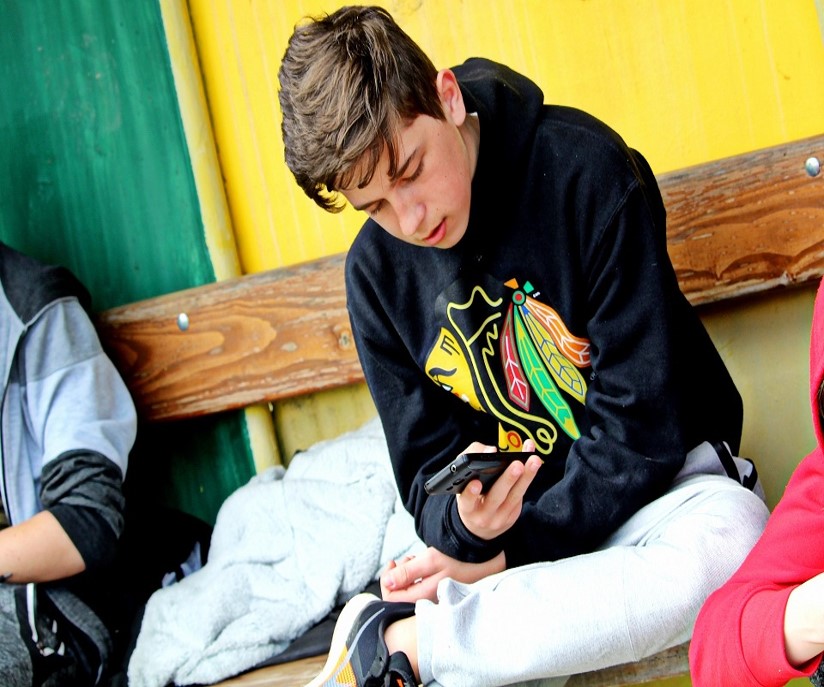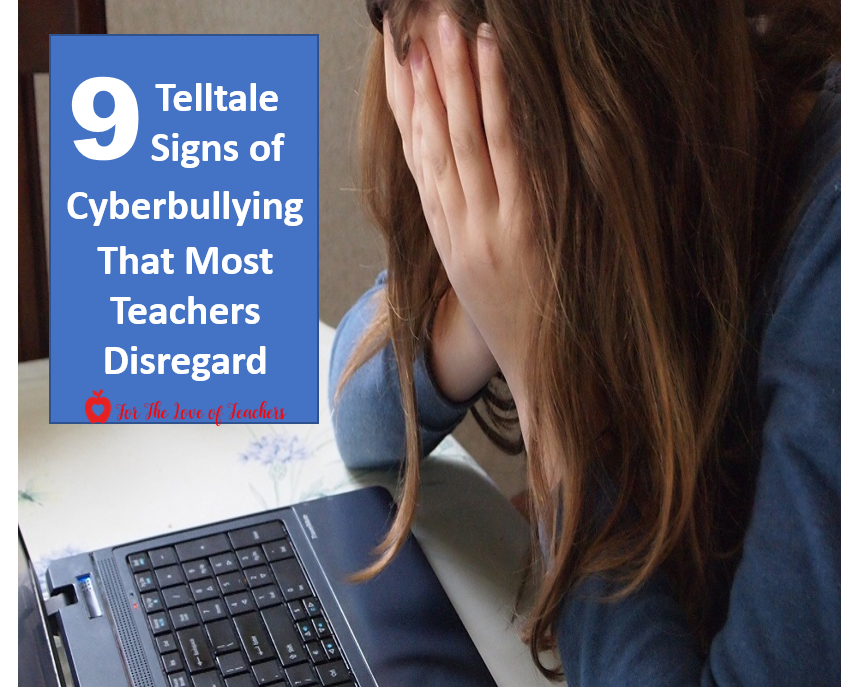Cyberbullying has become a growing problem with youngsters today. The fact that kids have phones and other devices at arm’s length all the time and are constantly connected on social media, makes it easy to target others in negative ways. Raising awareness about cyberbullying and being able to identify signs of it is so important as teachers. This week’s guest post shares 9 telltale signs of cyberbullying that may be too often disregarded.
Most teachers would agree that kids can be odd sometimes. They go through phases, try new things, and change their minds a lot. A spontaneous change in a child’s behavior isn’t always indicative of a greater problem – it’s a part of self-discovery.
While it’s perfectly normal for kids to venture into strange new territories sometimes, it’s not normal if these behaviors might indicate that the student may be facing cyberbullying from his or her peers. Unfortunately, many of those signs are often disregarded by some teachers, who either misinterpret them or fail to notice them at all. Do you recognize any of these signs?
1. Missing School
Some kids skip school to play video games and eat junk food all day. Other kids skip school because they’re uncomfortable around their classmates. Staying home feels easier to cyberbullied students – they won’t have to face the same people who damaged their self-esteem online. If you notice a student is missing an unusual amount of school, let their parents know. Ask their parents if they notice any signs of cyberbullying at home. These might include the child being hesitant to use the computer when parents are around, deleting their social media accounts, or even avoiding using the computer altogether.
2. Nervous and edgy when using a phone
This might be difficult to spot, especially if your classroom has introduced some sort of phone management system. However, even if your students aren’t allowed to use their phones during classes, you might still notice some possible signs of cyberbullying during periods. If you see your student going pale after hearing the sound a message notification sound and then becoming visibly nervous or angry while using their phone, it is a red flag.

What follows might often be either aggression, in the form of throwing the phone on the floor or squeezing it tightly, or withdrawal and apathy when a child quickly hides the phone in their backpack and becomes still and disconnected. Of course, a situation like that does not have to immediately imply cyberbullying. However, if you notice similar behaviors repeat, it’s time to approach the child.
3. Sudden Desire to Fit In
It’s normal for children to seek acceptance from their peers. Kids looking for common ground with others might just be trying to make friends. Kids who seem to bend over backward for acceptance may feel as though they’ve been pushed to do so. While this is among the least unhealthy coping mechanisms a child may use to overcome cyberbullying, it isn’t sustainable.
If you see that one of your students approaches a group of their peers and then quickly leaves, or is left by the group, this might be an indication that the student has become a victim of bullying behaviors. If afterward this student immediately checks their phone, exhibiting behaviors described in the previous point, they might have just been attacked online. Talk to the child about their new interests to assess whether or not their sudden desire for approval is normal and whether or not they are being cyberbullied.
4. Tired Students Who Can’t Focus
Anxiety and depression often cause students to lose sleep. When a kid is dealing with something tough, he or she probably isn’t getting a full night’s rest. Even if this isn’t the result of cyberbullying, it’s undoubtedly a sign that something is wrong. It might be the result of a time consuming new video game or a noisy neighbor, but it’s unwise to take chances in assuming the issue will resolve itself. If you notice a perpetually exhausted student, take that child to the side to discuss the matter with the student in private.

5. Argumentative Behaviors
Cyberbullying statistics show that more than half of people admit to having made at least one comment online that may be construed as a bullying comment. If a student exhibits negative behavior in the classroom, chances are they aren’t on their best behavior when they’re posting to social media. Sometimes, children bully others because they themselves have been bullied. Intervention can help to break the cycle.
6. Changes in Clique-Like Behavior
Kids who have a lot in common become friends. They naturally gravitate into social groups. Kids in dramatically different social groups and kids who fall outside the definitions of social groups are more likely to have the toughest time. If clique-like behavior seems to alienate a few particular students, speak with them. Make sure that they aren’t the targets of bullying or harassment at the hands of social cliques.
7. Going Without Lunch
Cyberbullying often breaks children’s confidence. When young and impressionable people are made to feel bad about the way they look, they may take drastic and dangerous actions to change their appearance. Skipping meals is common in children with self-esteem issues. Eating disorders are prevalent among children. Addressing the problem early can prevent children from becoming too engaged in or obsessed with eating habits, stifling potential eating disorders and reducing the risks to their health.
8. Inappropriate Clothing Choices
There’s no reason for students to be wearing long sleeves when it’s hot outside, but many children who engage in self-harming behavior will do just that. You need to be sure that students in unorthodox outfits aren’t simply making a fashion statement. Bullying and cyberbullying can lead children to hurt themselves. If you suspect a child in your class may be partaking in self-harm, contact the proper authorities immediately. It’s better to report it and be wrong than it is to be silent and allow the behavior to continue.
9. Visibly stressed when confronted
If, upon being approached by you, your student immediately covers the screen or hides their phone, as if ashamed of something, this might indicate that they have just been cyberbullied. Some teachers might read such behavior as the child trying to keep their privacy, but if you have noticed it repeat, it’s best to be direct with the child. If you approach them about being cyberbullied, and they become stressed, aggressive, or evasive, you can be almost sure you are dealing with a victim of online attacks.
Keep an open dialogue about cyberbullying with your students. Let them know that it’s safe to talk to you if they feel as though bullying and harassment outside of the classroom are negatively impacting their lives. If they reach out to you, remind them to pay no attention to haters and bullies, but also encourage them to work on and improve themselves to boost their self-esteem. You can’t take other children’s technology away, but you can absolutely encourage their parents to do so.
About Sienna:
Sienna Walker is an avid education, self-improvement and careers blogger who loves sharing her tips with students and young people who are looking for career opportunities. Feel free to follow Sienna @SiennaWalkerS and say “hi” to her.
If you like it, then pin it!



Christine Weis is a passionate educator, classroom management coach, wife, and mom of two busy boys. She enjoys teaching, writing, and creating resources for teachers.





This post is a lifesaver. I have a teen now and I freak when I think of cybery bullying. The worst is that you can’t monitor your child 24/7. I find comfort knowing these signs, thanks you.
I’m so glad that this is helpful to you. Having a teen isn’t easy and to worry about cyberbullying is so stressful. Thanks for reading!
Christine at For The Love of Teachers
This issue is so relevant today and addressing it is a great step forward. Important for all parents and the young adults who frequently try and bully others.
Thank you for sharing this. This is so important to be aware of.
Thanks…it really is! Thanks for reading!
Christine at For The Love of Teachers
Cyber bullying is awful and I hope that more parents can recognize this since it seems to occur out of school hours I suspect.
It really is and yes it does occur out of school hours. Thanks for reading!
Christine at For The Love of Teachers
Cyber bullying is no longer a problem with kids either. Adults can be devastating to anyone online. It is tragic.
Adults can be! Thanks for reading!
Christine at For The Love of Teachers
This is a really important blog post for every parent to read. Thank you for sharing these signs.
So true! Thanks for reading!
Christine at For The Love of Teachers
These are some wonderful tips when it comes to seeing the signs of cyberbulling. Once the laws catch up with cyberbullying (I am hoping that day comes) then possibly we will see less children suffering from its affects.
I agree! Thanks for reading!
Christine at For The Love of Teachers
Beautiful….beautiful content! I love it simply because it’s come in at a time when we are having trouble understanding children much more.
Thank you! Appreciate you reading!
Christine at For The Love of Teachers
It’s not easy to be cyber bullied as social media these days are easy to track. So be careful for what you post. Also, talk to support groups that may help.
True that can be tracked but it still happens so frequently and sometimes indirectly! Thanks for reading!
Christine at For The Love of Teachers
This is a great shoutout for both parents and teachers. Thank you for raising awareness to this because cyberbullying is definitely a serious matter.
Thank you! I hope it does raise awareness! Thanks for reading!
Christine at For The Love of Teachers
This is a very good guide for teachers AND parents to spot signs of cyberbullying. It is sad that these things have to happen. Kids are not emotionally strong to face these issues by themselves and we must be vigilant to spot changes in behavior and address the cause of it asap.
Thank you for your thoughtful comment! I couldn’t agree more! Thanks for reading!
Christine at For The Love of Teachers
Every parent needs to read this, reread it, and bookmark it. Cyberbullying has become so rampant and just vicious.
I agree! Eye opening for sure! Thanks for reading!
Christine at For The Love of Teachers